句子成分与句子结构
- 格式:doc
- 大小:54.00 KB
- 文档页数:3
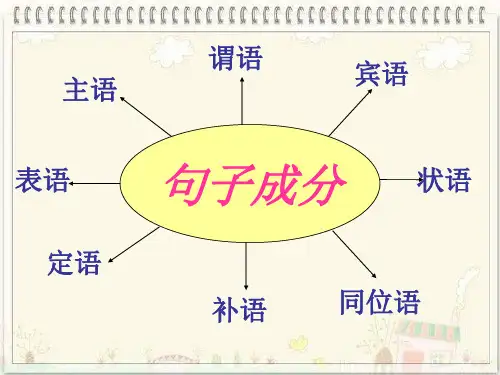
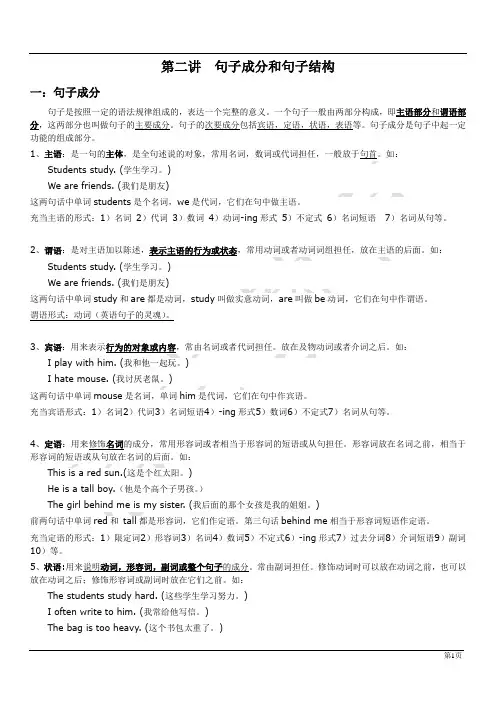
第二讲句子成分和句子结构一:句子成分句子是按照一定的语法规律组成的,表达一个完整的意义。
一个句子一般由两部分构成,即主语部分和谓语部分,这两部分也叫做句子的主要成分。
句子的次要成分包括宾语,定语,状语,表语等。
句子成分是句子中起一定功能的组成部分。
1、主语:是一句的主体,是全句述说的对象,常用名词,数词或代词担任,一般放于句首。
如:Students study. (学生学习。
)We are friends. (我们是朋友)这两句话中单词students是个名词,we是代词,它们在句中做主语。
充当主语的形式:1)名词2)代词3)数词4)动词-ing形式5)不定式6)名词短语7)名词从句等。
2、谓语:是对主语加以陈述,表示主语的行为或状态,常用动词或者动词词组担任,放在主语的后面。
如:Students study. (学生学习。
)We are friends. (我们是朋友)这两句话中单词study和are都是动词,study叫做实意动词,are叫做be动词,它们在句中作谓语。
谓语形式:动词(英语句子的灵魂)。
3、宾语:用来表示行为的对象或内容,常由名词或者代词担任。
放在及物动词或者介词之后。
如:I play with him. (我和他一起玩。
)I hate mouse. (我讨厌老鼠。
)这两句话中单词mouse是名词,单词him是代词,它们在句中作宾语。
充当宾语形式:1)名词2)代词3)名词短语4)-ing形式5)数词6)不定式7)名词从句等。
4、定语:用来修饰名词的成分,常用形容词或者相当于形容词的短语或从句担任。
形容词放在名词之前,相当于形容词的短语或从句放在名词的后面。
如:This is a red sun.(这是个红太阳。
)He is a tall boy.(他是个高个子男孩。
)The girl behind me is my sister. (我后面的那个女孩是我的姐姐。
)前两句话中单词red和tall都是形容词,它们作定语。
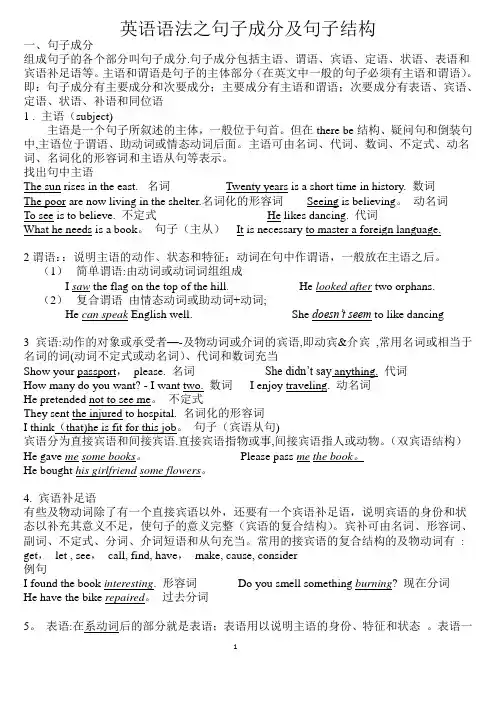
英语语法之句子成分及句子结构一、句子成分组成句子的各个部分叫句子成分.句子成分包括主语、谓语、宾语、定语、状语、表语和宾语补足语等。
主语和谓语是句子的主体部分(在英文中一般的句子必须有主语和谓语)。
即:句子成分有主要成分和次要成分;主要成分有主语和谓语;次要成分有表语、宾语、定语、状语、补语和同位语1 . 主语(subject)主语是一个句子所叙述的主体,一般位于句首。
但在there be结构、疑问句和倒装句中,主语位于谓语、助动词或情态动词后面。
主语可由名词、代词、数词、不定式、动名词、名词化的形容词和主语从句等表示。
找出句中主语The sun rises in the east. 名词Twenty years is a short time in history. 数词The poor are now living in the shelter.名词化的形容词Seeing is believing。
动名词To see is to believe. 不定式He likes dancing. 代词What he needs is a book。
句子(主从)It is necessary to master a foreign language.2谓语::说明主语的动作、状态和特征;动词在句中作谓语,一般放在主语之后。
(1)简单谓语:由动词或动词词组组成I saw the flag on the top of the hill. He looked after two orphans.(2)复合谓语由情态动词或助动词+动词;He can speak English well. She doesn’t seem to like dancing3宾语:动作的对象或承受者—-及物动词或介词的宾语,即动宾&介宾,常用名词或相当于名词的词(动词不定式或动名词)、代词和数词充当Show your passport,please. 名词She didn’t say anything. 代词How many do you want? - I want two. 数词I enjoy traveling. 动名词He pretended not to see me。
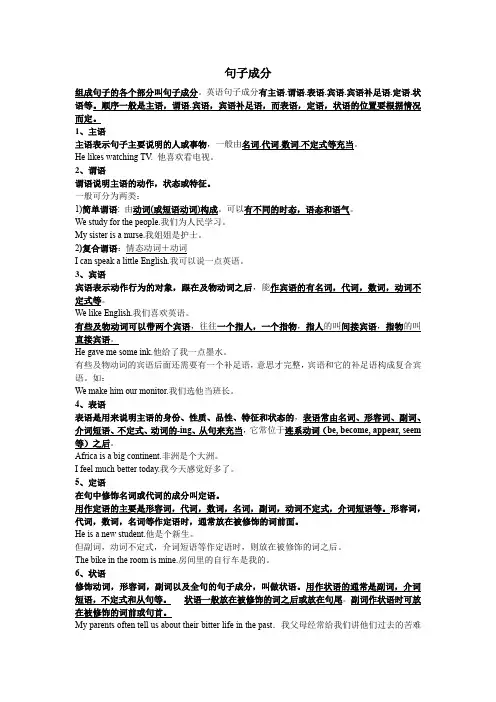
句子成分组成句子的各个部分叫句子成分。
英语句子成分有主语.谓语.表语.宾语.宾语补足语.定语.状语等。
顺序一般是主语,谓语.宾语,宾语补足语,而表语,定语,状语的位置要根据情况而定。
1、主语主语表示句子主要说明的人或事物,一般由名词.代词.数词.不定式等充当。
He likes watching TV. 他喜欢看电视。
2、谓语谓语说明主语的动作,状态或特征。
一般可分为两类:1)简单谓语: 由动词(或短语动词)构成。
可以有不同的时态,语态和语气。
We study for the people.我们为人民学习。
My sister is a nurse.我姐姐是护士。
2)复合谓语:情态动词+动词I can speak a little English.我可以说一点英语。
3、宾语宾语表示动作行为的对象,跟在及物动词之后,能作宾语的有名词,代词,数词,动词不定式等。
We like English.我们喜欢英语。
有些及物动词可以带两个宾语,往往一个指人,一个指物,指人的叫间接宾语,指物的叫直接宾语。
He gave me some ink.他给了我一点墨水。
有些及物动词的宾语后面还需要有一个补足语,意思才完整,宾语和它的补足语构成复合宾语。
如:We make him our monitor.我们选他当班长。
4、表语表语是用来说明主语的身份、性质、品性、特征和状态的,表语常由名词、形容词、副词、介词短语、不定式、动词的-ing、从句来充当,它常位于连系动词(be, become, appear, seem 等)之后。
Africa is a big continent.非洲是个大洲。
I feel much better today.我今天感觉好多了。
5、定语在句中修饰名词或代词的成分叫定语。
用作定语的主要是形容词,代词,数词,名词,副词,动词不定式,介词短语等。
形容词,代词,数词,名词等作定语时,通常放在被修饰的词前面。

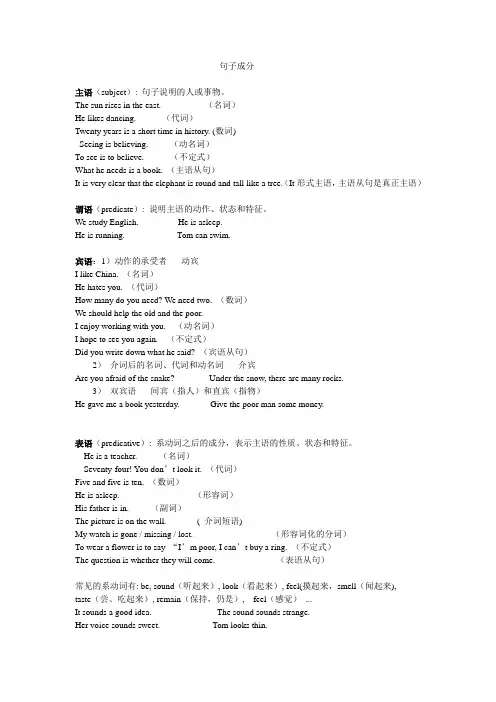
句子成分主语(subject): 句子说明的人或事物。
The sun rises in the east. (名词)He likes dancing. (代词)Twenty years is a short time in history. (数词)Seeing is believing. (动名词)To see is to believe. (不定式)What he needs is a book. (主语从句)It is very clear that the elephant is round and tall like a tree.(It形式主语,主语从句是真正主语)谓语(predicate): 说明主语的动作、状态和特征。
We study English. He is asleep.He is running. Tom can swim.宾语:1)动作的承受者-----动宾I like China. (名词)He hates you. (代词)How many do you need? We need two. (数词)We should help the old and the poor.I enjoy working with you. (动名词)I hope to see you again. (不定式)Did you write down what he said? (宾语从句)2)介词后的名词、代词和动名词-----介宾Are you afraid of the snake? Under the snow, there are many rocks.3)双宾语-----间宾(指人)和直宾(指物)He gave me a book yesterday. Give the poor man some money.表语(predicative): 系动词之后的成分,表示主语的性质、状态和特征。
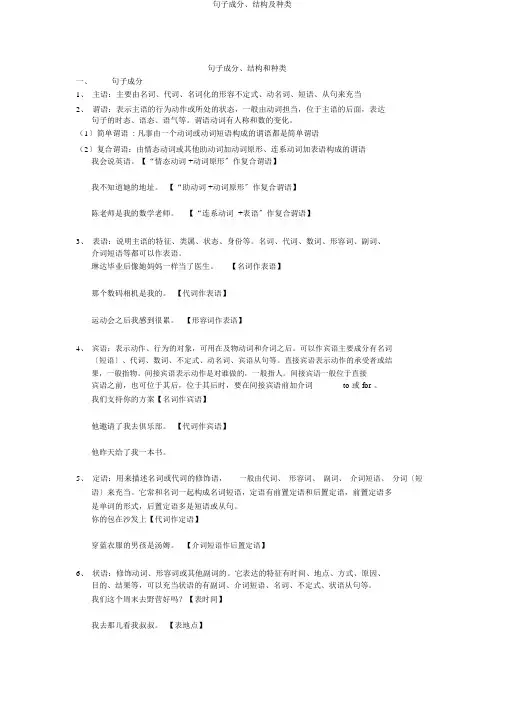
句子成分、结构和种类一、句子成分1、主语:主要由名词、代词、名词化的形容不定式、动名词、短语、从句来充当2、谓语:表示主语的行为动作或所处的状态,一般由动词担当,位于主语的后面,表达句子的时态、语态、语气等。
谓语动词有人称和数的变化。
(1〕简单谓语 : 凡事由一个动词或动词短语构成的谓语都是简单谓语(2〕复合谓语:由情态动词或其他助动词加动词原形、连系动词加表语构成的谓语我会说英语。
【“情态动词 +动词原形〞作复合谓语】_____________________________________________我不知道她的地址。
【“助动词 +动词原形〞作复合谓语】_____________________________________________陈老师是我的数学老师。
【“连系动词 +表语〞作复合谓语】_____________________________________________3、表语:说明主语的特征、类属、状态、身份等。
名词、代词、数词、形容词、副词、介词短语等都可以作表语。
琳达毕业后像她妈妈一样当了医生。
【名词作表语】_____________________________________________那个数码相机是我的。
【代词作表语】_____________________________________________运动会之后我感到很累。
【形容词作表语】_____________________________________________4、宾语:表示动作、行为的对象,可用在及物动词和介词之后。
可以作宾语主要成分有名词〔短语〕、代词、数词、不定式、动名词、宾语从句等。
直接宾语表示动作的承受者或结果,一般指物。
间接宾语表示动作是对谁做的,一般指人。
间接宾语一般位于直接宾语之前,也可位于其后,位于其后时,要在间接宾语前加介词to 或 for 。
我们支持你的方案【名词作宾语】_____________________________________________他邀请了我去俱乐部。
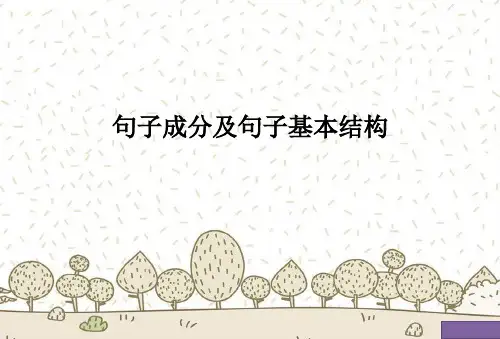
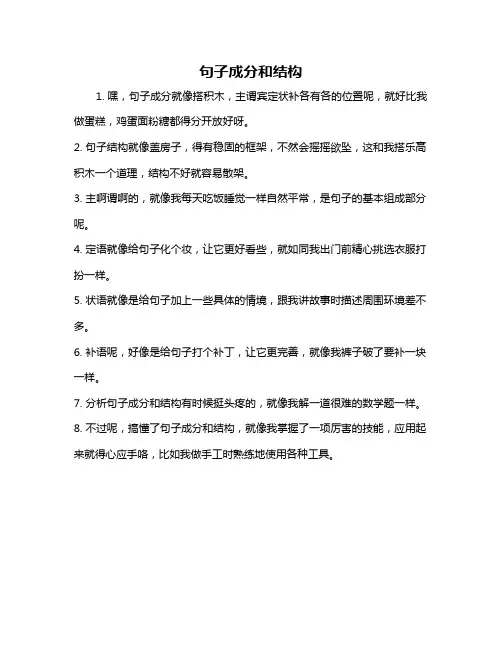
句子成分和结构
1. 嘿,句子成分就像搭积木,主谓宾定状补各有各的位置呢,就好比我做蛋糕,鸡蛋面粉糖都得分开放好呀。
2. 句子结构就像盖房子,得有稳固的框架,不然会摇摇欲坠,这和我搭乐高积木一个道理,结构不好就容易散架。
3. 主啊谓啊的,就像我每天吃饭睡觉一样自然平常,是句子的基本组成部分呢。
4. 定语就像给句子化个妆,让它更好看些,就如同我出门前精心挑选衣服打扮一样。
5. 状语就像是给句子加上一些具体的情境,跟我讲故事时描述周围环境差不多。
6. 补语呢,好像是给句子打个补丁,让它更完善,就像我裤子破了要补一块一样。
7. 分析句子成分和结构有时候挺头疼的,就像我解一道很难的数学题一样。
8. 不过呢,搞懂了句子成分和结构,就像我掌握了一项厉害的技能,应用起来就得心应手咯,比如我做手工时熟练地使用各种工具。
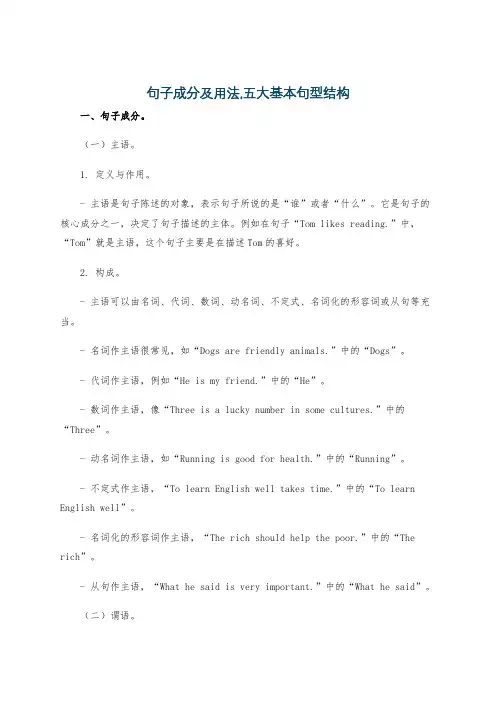
句子成分及用法,五大基本句型结构一、句子成分。
(一)主语。
1. 定义与作用。
- 主语是句子陈述的对象,表示句子所说的是“谁”或者“什么”。
它是句子的核心成分之一,决定了句子描述的主体。
例如在句子“Tom likes reading.”中,“Tom”就是主语,这个句子主要是在描述Tom的喜好。
2. 构成。
- 主语可以由名词、代词、数词、动名词、不定式、名词化的形容词或从句等充当。
- 名词作主语很常见,如“Dogs are friendly animals.”中的“Dogs”。
- 代词作主语,例如“He is my friend.”中的“He”。
- 数词作主语,像“Three is a lucky number in some cultures.”中的“Three”。
- 动名词作主语,如“Running is good for health.”中的“Running”。
- 不定式作主语,“To learn English well takes time.”中的“To learn English well”。
- 名词化的形容词作主语,“The rich should help the poor.”中的“The rich”。
- 从句作主语,“What he said is very important.”中的“What he said”。
(二)谓语。
1. 定义与作用。
- 谓语是对主语动作或状态的陈述或说明,指出“做什么”“是什么”或者“怎么样”。
在句子中,谓语动词的形式要与主语的人称和数保持一致。
例如在“Mary sings beautifully.”中,“sings”就是谓语,它描述了Mary的动作。
2. 构成。
- 谓语一般由动词充当,包括实义动词、系动词、助动词和情态动词等。
- 实义动词可以独立作谓语,表示具体的动作,如“eat”“drink”“run”等。
例如“He eats an apple.”中的“eats”。
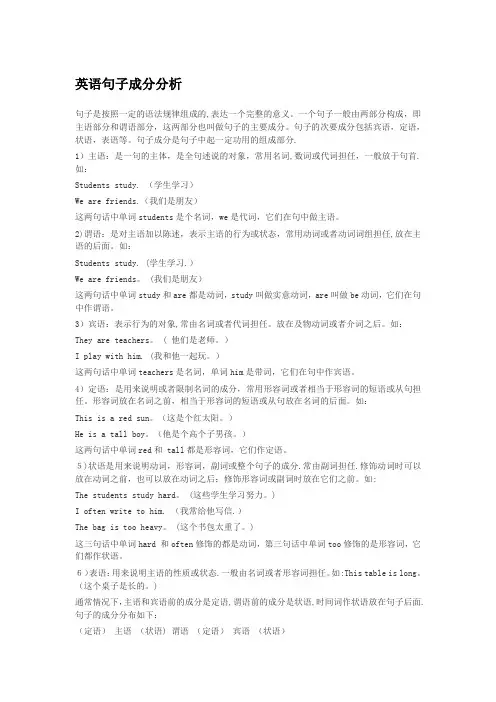
英语句子成分分析句子是按照一定的语法规律组成的,表达一个完整的意义。
一个句子一般由两部分构成,即主语部分和谓语部分,这两部分也叫做句子的主要成分。
句子的次要成分包括宾语,定语,状语,表语等。
句子成分是句子中起一定功用的组成部分.1)主语:是一句的主体,是全句述说的对象,常用名词,数词或代词担任,一般放于句首.如:Students study. (学生学习)We are friends.(我们是朋友)这两句话中单词students是个名词,we是代词,它们在句中做主语。
2)谓语:是对主语加以陈述,表示主语的行为或状态,常用动词或者动词词组担任,放在主语的后面。
如:Students study. (学生学习.)We are friends。
(我们是朋友)这两句话中单词study和are都是动词,study叫做实意动词,are叫做be动词,它们在句中作谓语。
3)宾语:表示行为的对象,常由名词或者代词担任。
放在及物动词或者介词之后。
如:They are teachers。
( 他们是老师。
)I play with him. (我和他一起玩。
)这两句话中单词teachers是名词,单词him是带词,它们在句中作宾语。
4)定语:是用来说明或者限制名词的成分,常用形容词或者相当于形容词的短语或从句担任。
形容词放在名词之前,相当于形容词的短语或从句放在名词的后面。
如:This is a red sun。
(这是个红太阳。
)He is a tall boy。
(他是个高个子男孩。
)这两句话中单词red和 tall都是形容词,它们作定语。
5)状语是用来说明动词,形容词,副词或整个句子的成分.常由副词担任.修饰动词时可以放在动词之前,也可以放在动词之后;修饰形容词或副词时放在它们之前。
如:The students study hard。
(这些学生学习努力。
)I often write to him. (我常给他写信.)The bag is too heavy。
句子结构与句子成分
句子结构是指句子的组成方式,包括主谓结构、主谓宾结构、主谓宾补结构、主谓双宾结构、主谓宾宾补结构、主谓状结构等。
句子成分是构成句子的基本要素,包括主语、谓语、宾语、补语、定语、状语和状语等。
主语:句子中表达动作或状态的中心,是句子的主要成分。
例如,"小明"是主语。
谓语:句子中表达动作或状态的关键,用来说明主语的动作、性质、状态等。
例如,"是"是谓语。
宾语:句子中被动作所直接作用的对象。
例如,"一名医生"是宾语。
补语:句子中用来补充说明主语或宾语的词或短语。
例如,"聪明"是主补,"到了三年级"是宾补。
定语:句子中用来修饰名词或代词的词或短语。
例如,"漂亮的花"中的"漂亮"就是定语。
状语:句子中用来修饰动词、形容词、副词或整个句子的词或短语。
例如,"昨天"是时间状语。
状语从句:用来修饰动词、形容词或副词的从句。
例如,"我希望他能来"中的"我希望"是主句,"他能来"是状语从句。
句子成分&句子结构一、句子成分句子成分主要包括主语、谓语、表语、宾语、定语、状语和补足语等;主语和谓语是句子的必需部分;宾语、表语和补足语是句子的必要部分;其他成分如状语和定语,是句子的辅助部分;有些句子还带有感叹语、插入语,它们在句法上与句子其他成分不存在关系,称为独立成分;1.主语: 主语是句中动作、行为、性质或状态的主体,是一个句子谈论的主题;主语可以由名词、代词、数词、动词不定式、动名词、从句等来充当;Some people can’t use the computer. 名词作主语He teaches us English. 代词作主语Three and five is eight. 数词作主语To read in bed is bad for your eyes. 不定式作主语Eating more vegetables is good for us. 动名词短语作主语That you forgot to tell me the time for the meeting caused me lots of trouble. 从句作主语广东Do you need more time to complete the taskYes, another ten days _____ enough.A, is B, are C, was D, were2.谓语: 谓语用来说明主语的行动、动作或所处的状态;谓语由动词或短语动词充当,一般放在主语之后;谓语可分为简单谓语和合成谓语;The boy speaks Japanese. 简单谓语Don’t get off the bus until it has stopped. 简单谓语I can play the baseball. 合成谓语Our city becomes more beautiful. 合成谓语3.宾语: 宾语表示动作、行为的对象,由名词、代词、数词、动名词、动词不定式或起名词作用的其他成分充当;I bought a book. 单宾语,名词The news surprised us. 单宾语,代词He told me the news about it. 双宾语,代词/名词A friend lent some money to me. 双宾语, 名词/代词We consider him an honest boy. 复合宾语Mr. Wang always makes his classes interesting. 复合宾语4.表语:表语用来说明主语的特征、属性、状态、身份等,与前面的连系动词一起构成系表结构作复合谓语;My pen friend is an American boy. 名词This book isn’t mine. 代词He was the first to come to school yesterday. 数词The man looks strong. 形容词My father is out. 副词His job is to clean the school. 动词不定式短语The dictionary is in the bag. 介词短语Wasting time is killing yourself. 动名词短语The trouble is that she has lost his phone number. 从句5.定语:定语是用来修饰名词或代词的句子成分,分为前置定语和后置定语两种; (1)前置定语:常用来充当前置定语的有形容词、代词、数词、名词或名词所有格,动词-ing 形式等;We had a good time in the park. adj.His father is doctor. pron.She cut the meat into two pieces. numeralThis is a stone table. n.Let’s put the child in the sleeping bag. v-ing(2)后置定语: 常用来充当后置定语的有形容词、副词、动词不定式、介词短语、分词短语和从句等;I have got something interesting to tell every one of you. Adj.The trees around were cut last week. Adv.Would do you like something to drink InfinitiveThe book on the bed is mine. Prepositional phraseThe model plane flying in the sky is made by Bill. Present participleThe woman who stands at the gate is my mother. Subordinate clause6.状语:状语常用来修饰动词、形容词、副词或整个句子;它可以表示时间、地点、程度、原因、目的、结果等;状语常由副词、介词短语、动词不定式、分词短语、从句等担当;They are walking in the park.He was looking everywhere for Jane.She was deeply moved by the story I told her.I’m sorry to keep you waiting for a long time.He spoke so fast that I couldn’t hear clearly what he said.7.补足语: 补足语是用来说明主语或宾语的性质、状态等的一种句子成分;含有宾语补足语的句子变为被动语态时,宾语补足语成了主语补足语;可以作为补足语的有名词、形容词、副词、介词短语、分词、动词不定式等;You must keep your bedroom clean.He was once again found wandering along the street.现在分词作主语补足语His parents made him stay at home. 动词不定式作宾语补足语→He was made to stay at home by his parents. 动词不定式作主语补足语8.同位语: 对句子中某一成分作进一步解释、说明,与其在语法上处于同等地位的句子成分即同位语;同位语常置于被说明的词之后;同位语由名词、代词、数词、从句等充当;This is Mr. Zhou, our headmaster.We each have a cellphone now.You may leave it to us two.We are excited about the news that we win the match.9.独立成分: 在句子中插入一个词或短语,这个词或短语并不和其他成分发生语法关系,此时这个词或短语就是一种独立成分;独立成分包括称呼语、感叹语、插入语等;Hurry up, friends, or we’ll be late. 称呼语作独立成分Aha I’ve got you right here. 感叹语作独立成分By the way, what do you usually do at weekend 插入语作独立成分二、句子结构英语句子按照结构可分为简单句、并列句和复合句;1.简单句:只有一个主语或并列主语和一个谓语或并列谓语的句子叫简单句;判断下列句子属于哪种简单句的基本句型:We walked and laughed.The children are playing.Children often sing this song.I don’t know what to do.My bike is new.He became a famous scientist.Mr. Wu teaches us English.My father bought me a new camera.We can hear someone playing the violin next door.We can keep it warm.拓展:There +be +主语+ 状语英语中有一个独特的句型叫there be 结构,该结构表示“某地/某时存在某人/某物”;There 无意义,be是谓语动词,它后面的名词是主语,两者在数上必须保持一致;句子最后为地点状语或时间状语;There is a car in front of the house.There are many books in his school bag.2.并列句: 并列句是由并列连词and, but, or, so等把两个或两个以上的简单句连在一起而构成的句子;并列连词的基本句子结构为:简单句+并列连词+ 简单句;(1)表示并列的并列连词I help her and she helps me.Both Wendy and Kate are from American.(2)表示选择的并列连词The girls can go with us, or they can stay at home.Either he or she is going to help us.(3)表示因果的并列连词The days are short, for it is now December.The boy did his homework carefully, so he never made any mistakes(4)表示转折的并列连词It is very good, yet it can be better.He is old but he is in good health.That region has plenty of natural resources while this one has none.3.复合句: 由一个主句和一个或一个以上的从句构成的句子叫做复合句;主句为句子的主体,从句不能独立,仅用作句子的一个成分,如主语、宾语、表语、同位语、定语、状语等;We shouldn’t give our children whatever they want.I’ll never forget the stories that my grandma told me.He worked for a foreign company when he was in Shanghai.一.划出下列句子中的主语①A mooncake is a delicious, round cake.②I don’t know if it will grow.③ Doing your homework in time is important.④To win the game is difficult.⑤There are some people in our classroom.⑥Five is not enough.二. 划出下列句子中的谓语①I saw a girl.②I love you.③ You should work English hard.④You had better take a bus.⑤I want to give you a book.三.划出下列句子中的宾语①I saw a cat in the tree.②We think you are right.③ My father bought me a book.④We call him LaoWang.⑤We forgot to close the window.四.划出下列句子中的定语①That is a beautiful flower.②This is my book, not your book.③ I have a lot of things to do.④I have met the boy in that room.⑤He has something important to say.五.划出下列句子中的状语①He is playing under the tree.②Ten years ago, She began to live in Dalian.③ The house is dirty because he didn’t clean it.④He buys a gift to make her happy.⑤If I am not busy tomorrow, I will play football with you.六. 划出下列句子中的表语①These desks are yellow.②It is getting cooler and cooler now.③ My work is teaching English,④It sounds good.⑤It smells nice.七. 划出句中的直接宾语和间接宾语① Please tell us a story.② My father bought a new bike for me last week.③ Mr. Li is going to teach us history next term.④ Here is a pen. Give it to Tom.⑤ Did he leave any message for me。
句子成分主要成分有主语和谓语;次要成分有表语、宾语、定语、状语、补足语、同位语和插入语。
主语:表示句子说的是什么人或什么事.是一个句子所叙述的主体,一般位于句首。
但在there be 结构、疑问句(当主语不疑问词时)和倒装句中,主语位于谓语、助动词或情态动词后面。
主语可由名词、代词、数词、不定式、动名词、名词化的形容词和主语从句等表示。
例如:1.During the 1990s, American country music hasbecome more and more popular. 名词2.We often speak English in class. 代词3.One-third of the students in this class are girls. 数词4.To swim in the river is a great pleasure. 不定式5.Smoking does harm to the health. 动名词6.The rich should help the poor. 名词化的形容词7.When we are going to have an English test hasnot been decided.主语从句8.It is necessary to master a foreignlanguage.it 作形式主语,真正的主语为后面的不定式谓语说明主语所做的动作或具有的特征和状态。
动词在句中作谓语,一般放在主语之后。
谓语的构成如下:1、简单谓语:由一个动词或动词短语构成。
如:He practices running every morning.2、复合谓语:(1)由情态动词加动词原形构成。
如:You may keep the book for two weeks.(2)由助动词加动词原形,现在分词,过去分词构成。
如:Do you speak English?They are working in a field.He has caught a bad cold.(3)由系动词加表语构成。
一、句子成分句子成分的定义:构成句子的各个部分叫做句子成分。
包括:主语,谓语,表语、宾语、定语、状语、补足语和同位语。
(一)主语:主语是一个句子所叙述的主体,一般位于句首。
但在there be结构、疑问句(当主语不疑问词时)和倒装句中,主语位于谓语、助动词或情态动词后面。
主语可由名词、代词、数词、不定式、动名词、名词化的形容词和主语从句等表示。
例如:During the 1990s, American country music has become more and more popular.(名词)We often speak English in class.(代词)One-third of the students in this class are girls.(数词)To swim in the river is a great pleasure.(不定式)Smoking does harm to the health.(动名词)The rich should help the poor.(名词化的形容词)When we are going to have an English test has not been decided.(主语从句)It is necessary to master a foreign language.(it作形式主语,真正的主语为后面的不定式)(二)谓语:谓语说明主语所做的动作或具有的特征和状态。
动词在句中作谓语,一般放在主语之后。
谓语的构成如下:1、简单谓语:由一个动词或动词短语构成。
如:He practices running every morning.2、复合谓语:(1)由情态动词或其他助动词加动词原形构成。
如:Y ou may keep the book for two weeks. He has caught a bad cold.(2)由系动词加表语构成。
句子成分与句子结构每个句子里的词与词之间都有一定的组合关系,按照不同的关系,可以把句子分为不同的成分。
在初中英语中,句子的成分包括主语、谓语、宾语、定语、状语、表语、宾语补足语七种。
A)句子成分框架图:1.主语(一)用横线画出下列句中主语的中心词。
1.The teacher with two of his students is walking into the classroom.2.There is an old man coming here.3.The useful dictionary was given by my mother last year.4.To do today's homework without the teacher's help is very difficult.2.谓语(二)选出句中谓语的中心词。
( B )1.I don't like the picture on the wall.A.don'tB.likeC.pictureD.wall( A )2.The days get longer and longer when summer comes.A.getB.longerC.daysD.summer( C )3.Do you usually go to school by bus?A.DouallyC.goD.bus( A )4.There will be a meeting at the library this afternoon.A.will beB.meetingC.the libraryD.afternoon( C )5.Did the twins have porridge for their breakfast?A.DidB.twinsC.haveD.breakfast3.表语(三)用横线画出下列句中的表语。
1.The old man was feeling very tired.2.Why is he worried about Jim?3.The leaves have turned yellow.4.Soon they all became interested in the subject.5.She was the first to learn about it.4.宾语如:Could you lend me your bicycle?(=Could you lend your bicycle to me?)你能把你的自行车借给我吗?He bought his mother a handbag.(=He bought a handbag for his mother.)他给他妈妈买了一个手提包。
语法复习----句子成分构成句子的各个部分叫做句子成分。
一.主语(Subject)❖是一个句子所叙述的主体,一般位于句首。
主语可由名词、代词、数词、不定式、动名词、名词化的形容词等充当。
例如:1.During the 1990s, American country music has become more and more popular.2.We often speak English in class.3.One-third of the students in this class are girls.4.To swim in the river is a great pleasure.5.Smoking does harm to the health.6.The rich should help the poor.二.谓语:说明主语所做的动作或具有的特征和状态。
谓语由动词(或动词短语)充当,一般放在主语之后,并且由时态和语态(即主动语态和被动语态)来决定谓语的形式。
He practices running every morning.The p lane took off at ten o’clock.You may keep the book for two weeks.He has caught a bad cold.三.宾语宾语(Object)表示动作的对象或承受者,一般位于及物动词或介词后面。
例如:1.They went to see an exhibition yesterday.2. He is thinking of a difficult problem.宾语可以用名词、代词、动名词、不定式和名词化的形容词等来充当。
1.They went to see an exhibition yesterday.2.The heavy rain prevented me from coming to school on time.4.They helped the old with their housework yesterday.5.He pretended not to see me.6.I enjoy listening to popular music.❖双宾语(间接宾语+直接宾语)To: write, tell, pass, give, send, promise, show, hand, read, tell, bring, throw等如:He sent the novel to William yesterday.For: leave, buy, build, choose, cook, draw, find, get, order, post, save等如:She bought a gift for her mother❖下列动词只能接不定式做宾语ask, agree, choose, , want, desire demand, dare, decide, expect, fail, help, wish, hope, learn, manage, offer, plan, prepare, pretend, promise, refuse等❖下列动词只能接动名词做宾语admit, avoid, advise, suggest, consider, enjoy, escape, finish, imagine, mind, practise等❖下列动词既可接不定式,也可接动名词做宾语,但意义不同,如stop, mean, remember, forget, regret等。
四.表语(Predicative)用以说明主语的性质、特征、状态与身份,它一般位于系动词(如be, become, get, look, grow, turn, seem等)之后。
表语一般由名词、代词、形容词、数词、副词、不定式、动名词、分词、介词短语等表示。
1.Our English teacher is an American.2.Is it yours?3.The weather has turned cold.4.The speech is exciting.5.The students are excited.6.His job is to teach English.7.His hobby is playing football.8.The meeting is of great importance.9.Time is up. The class is over.系动词的分类:1.be: He is a teacher.2.表示保持某种状态:有keep,remain, stayHe always kept silent at meeting.3.表示“看起来像” ,主要有seem, appear, look,He seems (to be) very sad.4.表示“感官”系动词主要有feel, smell, sound, taste,This kind of cloth feels very soft.5.表示“变得”主要有become, grow, get, turn, go, fallThe climate is becoming warmer and warmer.Meat goes bad easily in hot weather.He fell ill last night.6.表达"证实":prove, turn outThe rumor proved false.His plan turned out a success.五.宾语补足语英语中有些及物动词,除有一个直接宾语以外,还要有一个宾语补足语才能使句子的意义完整。
带有宾语补足语的一般句型为:❖某些及物动词:如have/get/make/find(发现)/see/hear等+宾语+宾补❖宾补可由名词、形容词、副词、不定式、分词、介词短语等充当。
1.His father named him Dongming.2.They painted their boat white.3.Let the fresh air in.4.You mustn’t force him to lend his money to you.5.We saw her entering the room.6.We found everything in the lab in good order.六.定语:修饰名词或代词,一般翻译成“……的"1. Guilin is a beautiful city.2.China is a developing country。
3.America is a developed country.4 .His rapid progress in English made us surprised.5.Our monitor is always the first to enter the classroom.6.The teaching plan for next term has been worked out.7.He is reading an article about how to learn English.七.状语修饰动词、形容词、副词或整个句子,说明动作或状态特征的句子成分,叫做状语10种状语种类如下:1. How about meeting again at six? (时间)2. Mr Smith lives on the third floor. (地点)3.I shall go there if it doesn’t rain. (条件)4. Last night she didn’t go to the dance party because of the rain. (原因)5.He was so tired that he fell asleep immediately. (结果)6. In order to catch up with the others, I must work harder. (目的)7. Our teacher came in, smiling. (伴随)8. She works very hard though she is old. (让步)9. She put the eggs into the basket with great care. (方式)10. My bag is larger than yours. (比较)八.同位语对前面的名词或代词做进一步的解释This is Mr. Zhou, our headmaster.九.插入语(Parenthesis)对一句话做一些附加的解释,通常有to be honest , I think (suppose, believe等放句子中间时),如:To be frank, I don’t quite agree with you.Your idea, I think, is not wise.句子结构:一.简单句:简单句五大基本句型:1.主语+谓语(vi)The sun rises.2. 主语+谓语(vt)+宾语I saw a film3.主语+谓语(系动词)+表语Mrs. Brown looks very healthy.4.主语+谓语(vt)+双宾语(间接宾语和直接宾语)Mr Green taught us German last year.5.主语+谓语(vt)+宾语+宾语补足语I heard him singing.二.并列句:简单句+并列连词+简单句常用的并列连词有:and, but, or, not only……but also,neither……nor,either……or……I have two brothers,and they are lawyers.三.复合句: 主句+从句引导词(从属连词)+从句She is a girl who likes playing basketball.练习:用适当的连词填空1.Go along the street,_______ you'll find the shop.2.The weather was very cold,_______ many people were ill.3.People think we look the same,_______ I can see that we're different.4.I know him _______ I can't remember his name.5.You may go with him _______ stay at home.6.Let's take the stone away,_______ there may be an accident.7.I don’t think _______ he will be back soon.8. ______you work hard, you will pass the exam.9. Those ______ are kind can always get rewarded.。